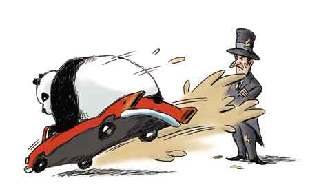
[By Liu Rui/Global Times]
|
|
|
[By Liu Rui/Global Times] |
China has drawn increasing world attention since it became the second largest economy. The nation confronts growing development obstacles.
The West has switched from supporting China's reform and opening-up policy to griping about it. China's unexpected speed of development is very likely to alter the dominating economic status of Japan and Europe. It might also accelerate the possible Sino-US strategic collision.
China and other emerging nations are more like competitors than cooperators in various respects, including the reform of the UN Security Council, the yuan exchange rate, resources and the competition for discourse power.
The US made use of the anxiety harbored by China's neighboring nations to create estrangement between the two sides via territorial disputes and similar international conflicts. China's neighboring countries are also given to drawing support from global giants to constrain China's expansion in the Asia-Pacific region.
When it comes to developing nations, the traditional common identity and values between them and China are changing. Their complaints about China might be increasing owing to their anticipation of China's expansion, as well as the West's instigation, and the fierce competition with the emerging economies.
Pressure is mounting on China when it comes to fulfilling its foreign aid, the UN Millennium Development Goals and in coping with global challenges.
Their concerns over China's fast development not only reveals their fear of whether China will take a peaceful route but also what influence the emerging China may have on them and what international concepts China may propose after its rise.
China needs to take a strategy of "inclusive rising," which not only accepts the West's continued peaceful growth but also the representative development routes adopted by other emerging developing countries.
This can promote the idea of "development for the world, development that relies on the world and shared by the world," so as to realize an all-around, coordinated and sustainable development.
So far, China faces more and more "emerging bottlenecks" despite its great successes. Some are advocating a "China-centered theory", or "China exceptionalism," an overreaction to "West-centered theory" or "US exceptionalism." Others praise the innovation of the Chinese model, without realizing that the model needs to adapt to the pressures of globalization.
Above all, we need to realize inclusive growth within the country. The fundamental purpose of inclusive growth is to enable people across the world to enjoy the fruits of economic globalization and realize coordinated economic and social advancement through sustainable approaches.
Consequently, we urgently need to transform the GDP-targeted view of political achievements and carry forward a scientific outlook.
We should also promote inclusive development among our neighbors. Showing a reliable and humane China can work wonders in our regional relationships. Both sides should understand the interests and desires of their counterparts. This can provide a regional basis for China's development.
We have to prevent the West from declining sharply. We should avoid the West's combating logic and their conception of a zero-sum game, a situation where a participant's gains or losses is totally decided by that of the other participants.
China should be determined to carry out an all-around reform and absorb all human kind's civilizations. Self-conceited arrogance and the supposed claims of victory over the West should be avoided.
It's unwise to develop too quickly. More haste means less speed. Outshining others and caring merely about ourselves can only result in the nation's detachment from the world and create more global obstacles.
Direction comes before speed. We need to mention less "Chinese characteristics" or harmonious diversity but underline tolerance, consensus and the idea that "all roads lead to Rome."
The inflated development route should be discarded and bumps in the road should be eliminated.